Inspiring and fun bathroom paint ideas to inspire any wash space
A lick of paint can do wonders and won’t cost a fortune, as these inspiring bathroom paint ideas prove

Holly Cockburn
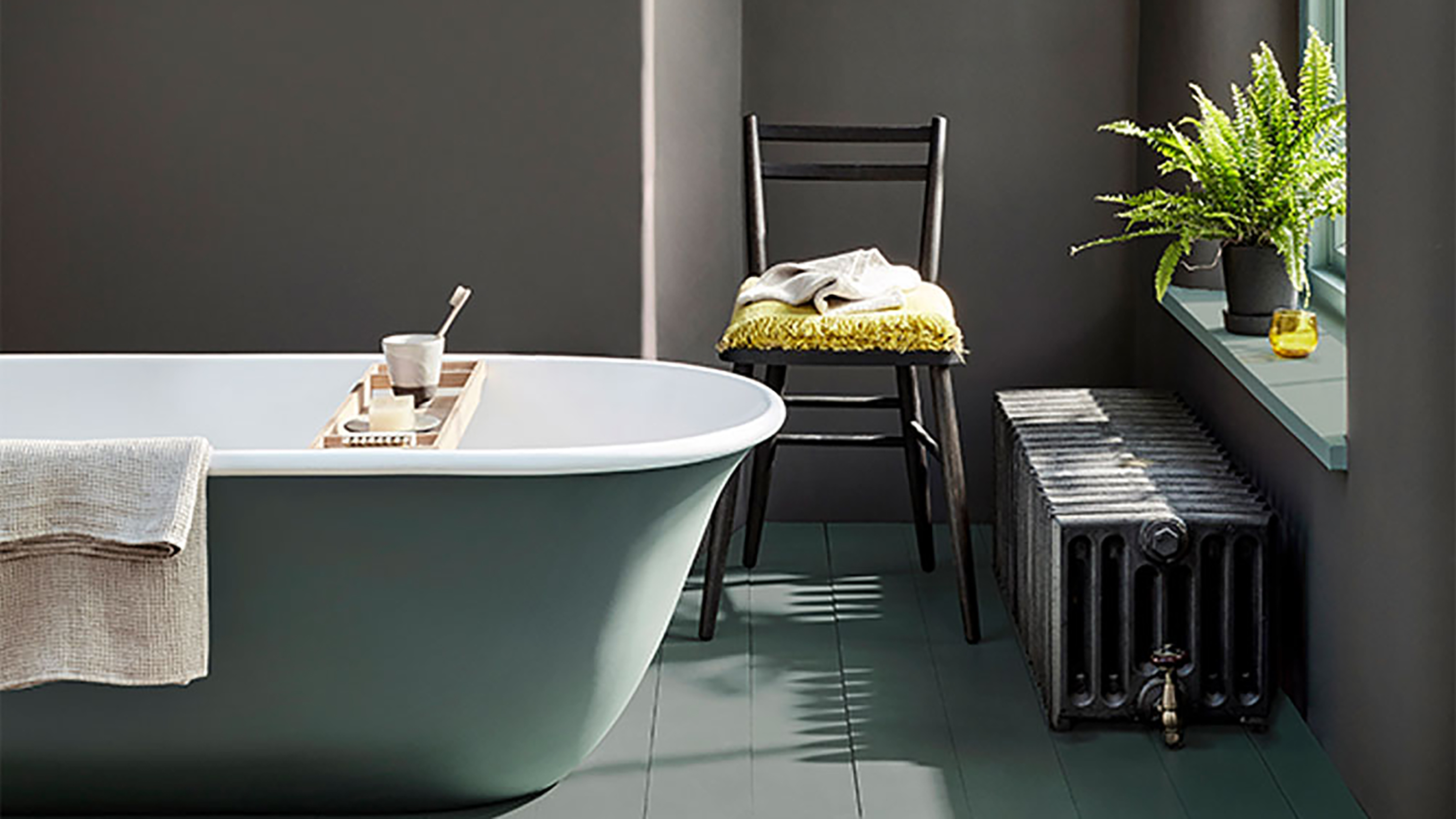
- 1. Paint the tub a statement shade
- 2. Choose the right shade of grey
- 3. Create drama with an all-black bathroom
- 4. Combine paint with a pretty wallpaper
- 5. Add height with lofty stripes
- 6. Use paint to create a chequerboard floor
- 7. Brighten up a small en-suite
- 8. Reflect light to make a small bathroom feel bigger
- 9. Perk up a white bathroom with blocks of colour
- 10. Paint panelling in wipe-clean finish
- 11. Take a dark colour wall to wall
- 12. Zone a space with paint
- FAQs
Colour can be a game changer. And when it come to bathroom paint ideas, there’s no easier way of brightening up a tired bathroom than simply grabbing a pot of paint and a roller and splashing on the paint.
While playing safe with colour used to be the norm, the latest looks for bathrooms see colour playing a bigger part than ever - and paint being used for bolder bathroom colour schemes.
Some of the simplest bathroom paint ideas can create the biggest ‘wow’ factor. Whether it’s painting the ceiling pink, colour blocking or going for bold with an all-black colour scheme, use these bathrooms as inspiration before you head out to stock up on expert-approved paint colours for your next project.
Bathroom paint ideas
‘Often the smallest room in the home, the bathroom has for too long become the victim of the ‘all white makes it look bigger’ design philosophy,’ says Justyna Korczynska, colour consultant at Crown. ‘Thankfully upcoming trends embrace a more creative and bold approach to what can be one of the most exciting spaces in the home.’
So why not be more adventurous with your bathroom space and get creative with colour?
1. Paint the tub a statement shade
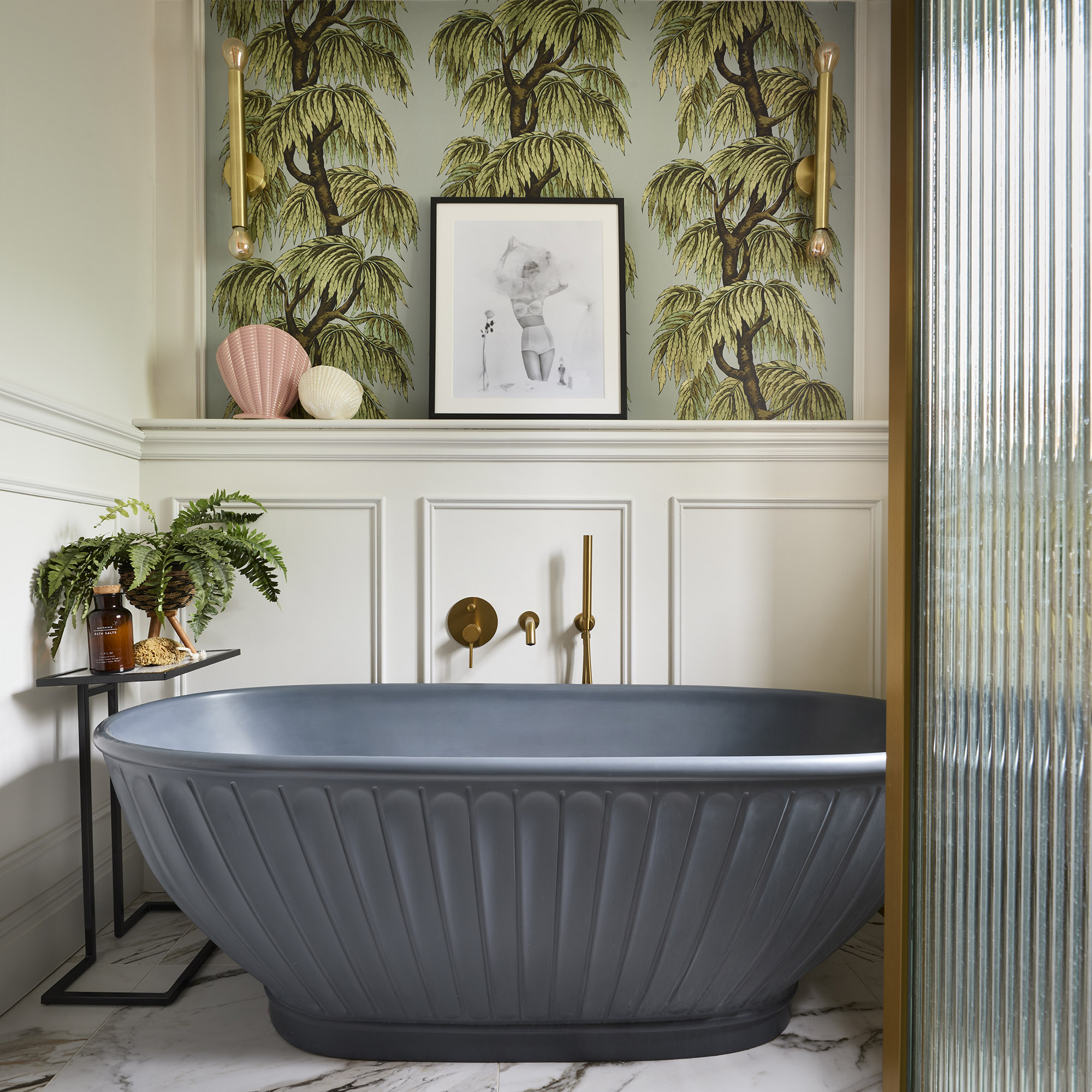
Give a large bathroom a focal point by buying a coloured bath or even painting a freestanding bath in a bright shade. Greys and muted neutrals can feel flat and cold without any contrast colour, but introducing brighter tones like pink is a great way of bringing warmth to a dreary scheme.
Before painting the exterior of a bath, you’ll need to prime the surface first. If it’s an acrylic bath, use a specialist acrylic primer. New cast iron baths often come pre-primed ready for painting, but check with your manufacturer first.
Sign up to our newsletter for style inspiration, real homes, project and garden advice and shopping know-how
If it’s an older cast-iron bath, remove any rust before painting, then use an oil-based metal primer, like this Ronseal one from Amazon, followed by your top coat. Eggshell paint will give a soft sheen, or try gloss for a more lustrous finish.
2. Choose the right shade of grey
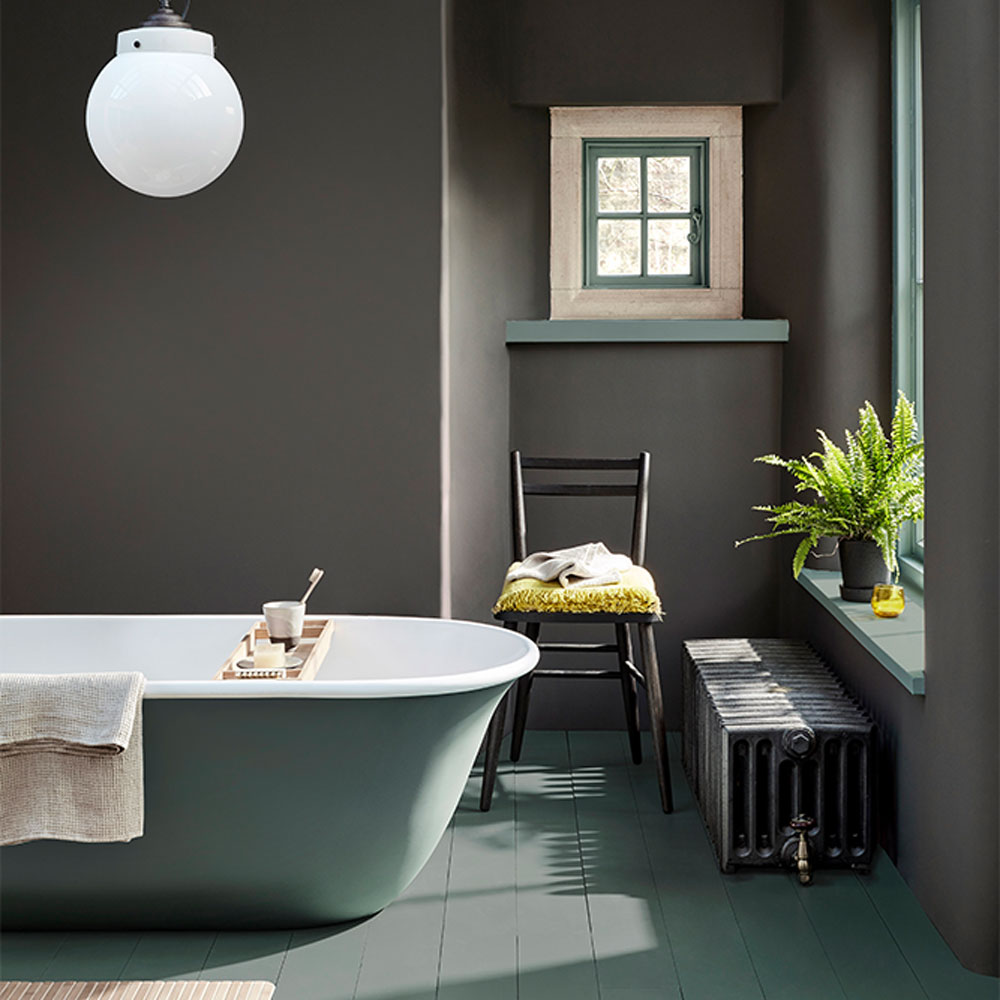
Grey is a calming, soothing colour that can be a great choice for a bathroom. However choosing the right shade for a grey bathroom idea is key, as different types of light can alter its effects and qualities.
For south-facing bathrooms with lots of natural light, cool greys will keep the look crisp and bright and can make a small bathroom feel airy and more spacious. For north-facing bathrooms, that can sometimes feel chilly, opt for warm-toned greys that add depth and cosiness to the scheme.
‘When selecting a colour for your bathroom, consider shades that exude tranquillity and serenity so you can create a haven for relaxation,’ says Ruth Mottershead, creative director at Little Greene. ‘To create a scheme that provides you with a calm retreat, use colours with warm undertones that add a comforting feel to a space.’
3. Create drama with an all-black bathroom
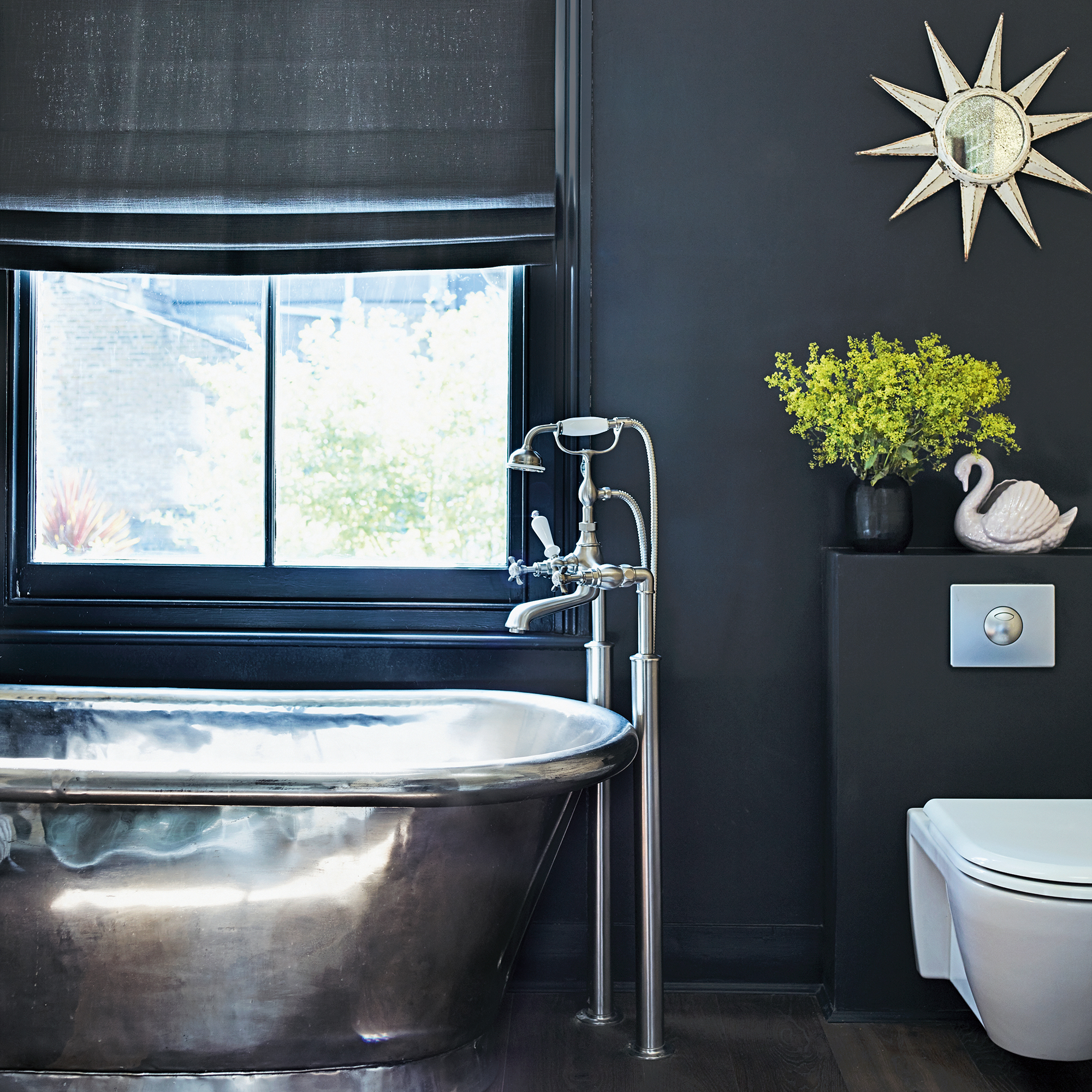
Thought that black was off limits in a small bathroom? Black bathroom ideas can look super striking, whether used in a small area as an accent colour, or more dramatically, with black wall to wall.
Using a dark colour all-over, on walls, floor and ceiling in a small bathroom will envelop the space and make it feel cosy and more intimate. In a larger space, using the same colour throughout will create a seamless, unified look and can help bring focus to fittings, such as a statement bath or basin.
Do justice to a dramatic scheme, by bringing in extra shine and shimmer on fixtures and fittings. Polished taps, gilt mirrors, brushed brass accessories and accent lighting will bring sparkle and prevent the black from feeling too dark and overpowering.
‘For ventilated bathrooms, our washable Intelligent Matt Emulsion has the hallmark flatness of our classic wall paints,’ says Ruth.
4. Combine paint with a pretty wallpaper
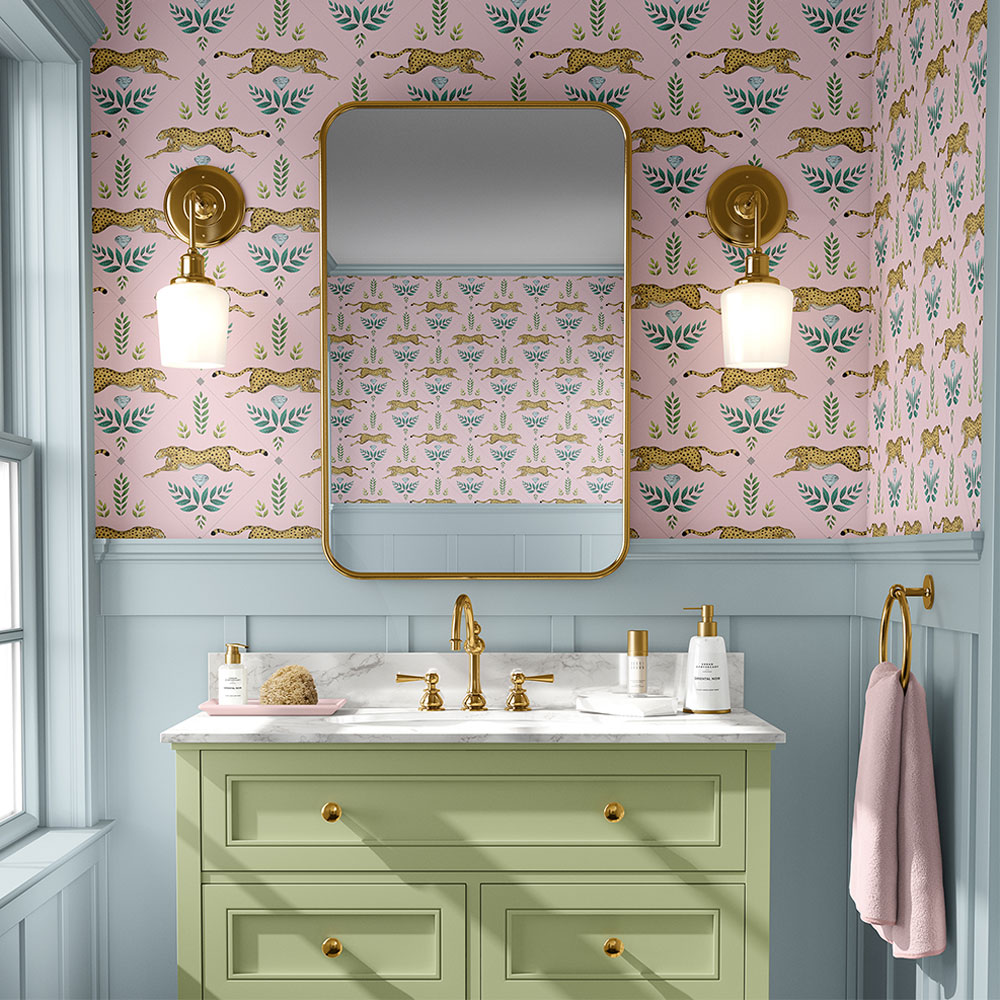
Don’t rule out a bathroom wallpaper idea. While regular wallpaper won’t be able to withstand the humidity that you’d get in an average-sized bathroom, using a waterproof or water-resistant vinyl wallpaper will deflect any moisture.
Try combining panelling with wallpaper around a basin area. Painted panelling on the lower section of wall, around a sink-side area, will be able to cope with any water splashes and spray. Just choose a semi-gloss or eggshell paint with a water-resistant finish that can be easily wiped clean.
For a fun colourful look, we love the Wild AF wallpaper from Lust Home. It will transform a cloakroom with minimal effort.
5. Add height with lofty stripes
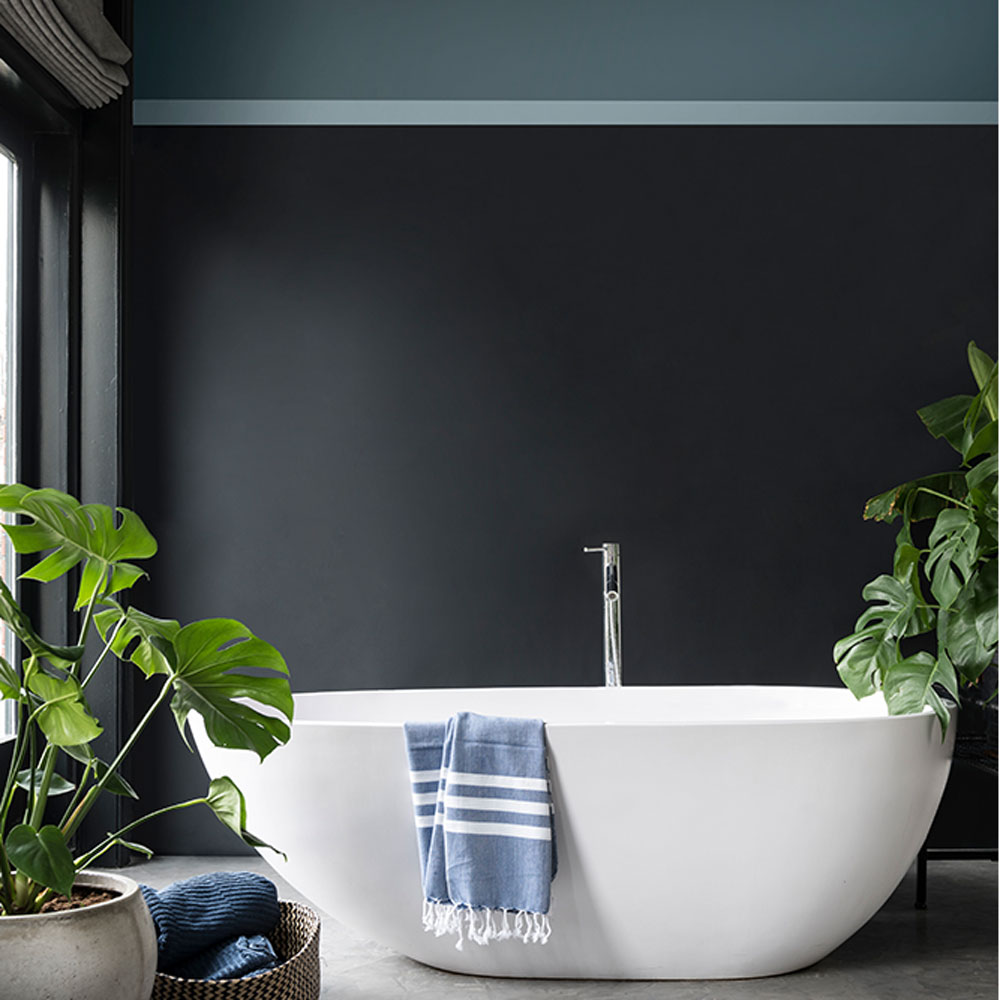
Create the feeling of height in a low-ceilinged bathroom with walls painted in a mix of inky stripes. Start with a darker shade at the bottom to create a moody backdrop, then add a band of paler colour above the dado rail and onto the ceiling. Counteract the darkness with flooring in light-reflective marble or stone, with a sparkling statement bath centre stage.
‘Get more creative and try out a simple mural of geometric shapes including arcs and circles that go up onto the ceiling,’ says Marianne Shillingford, creative director at Dulux. ‘Hardworking spaces deserve a bit more attention and because bathrooms tend to be small, even an ambitious project won’t take ages to achieve.’
6. Use paint to create a chequerboard floor
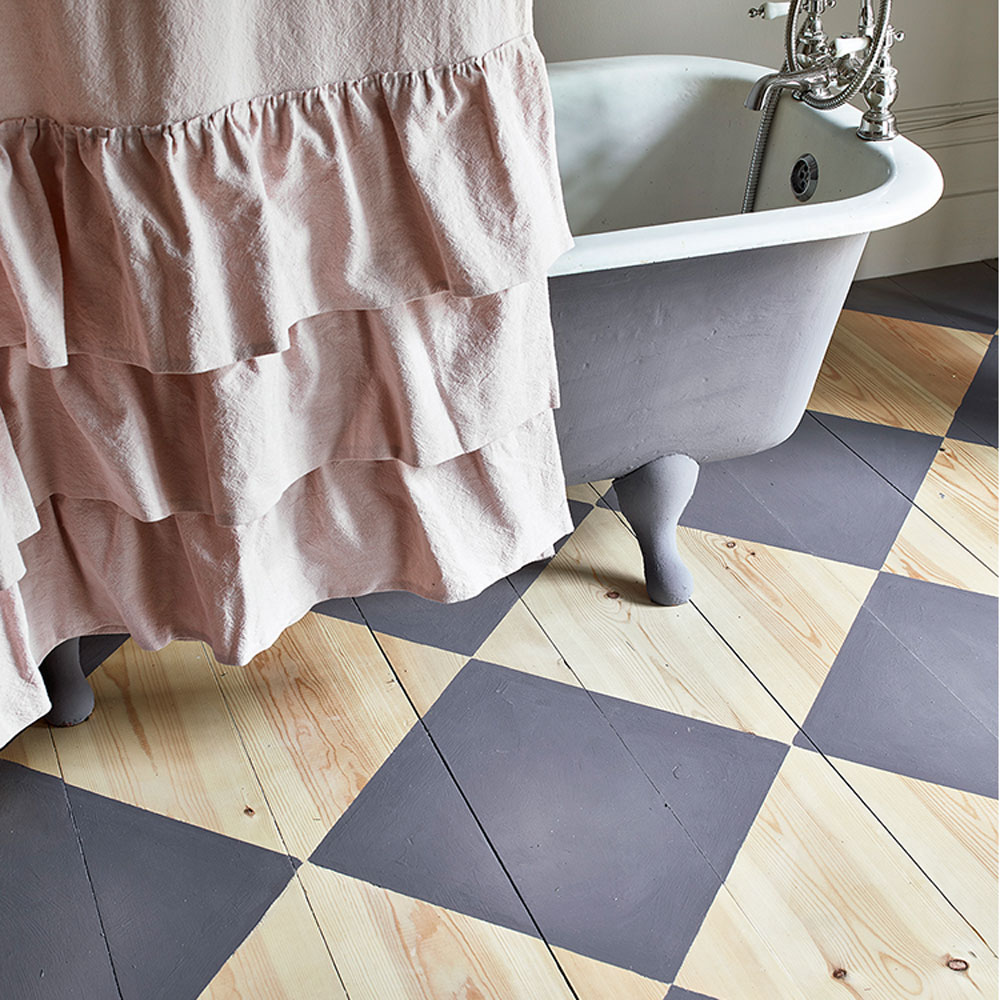
Breathe life into a shabby bathroom flooring idea by creating a colourful chequerboard effect using paint instead of tiles. Save prep time by using chalk paint - Annie Sloan’s can be used on furniture and timber floors and shouldn’t require any priming beforehand - though you’ll need to do a test patch first to check.
Wooden floors should be cleaned thoroughly before applying chalk paint and might need a light sanding to remove any previous paint or varnish. To create the chequerboard effect, you’ll need to use a tape measure and pencil, drawing out the guidelines and applying masking tape to get a sharp edge.
‘Choose your colour and start at the furthest point in the room from the door using a small brush with a flat edge and fill in the squares,’ advises Annie Sloan. ‘Once the first coat has dried, apply the second coat and leave to dry fully before applying Chalk Paint Lacquer – you will probably need two to three coats of this.'
'After it has dried, it will go through a further curing process over 14 days to fully harden. You will be able to walk on it, but be gentle.’
7. Brighten up a small en-suite
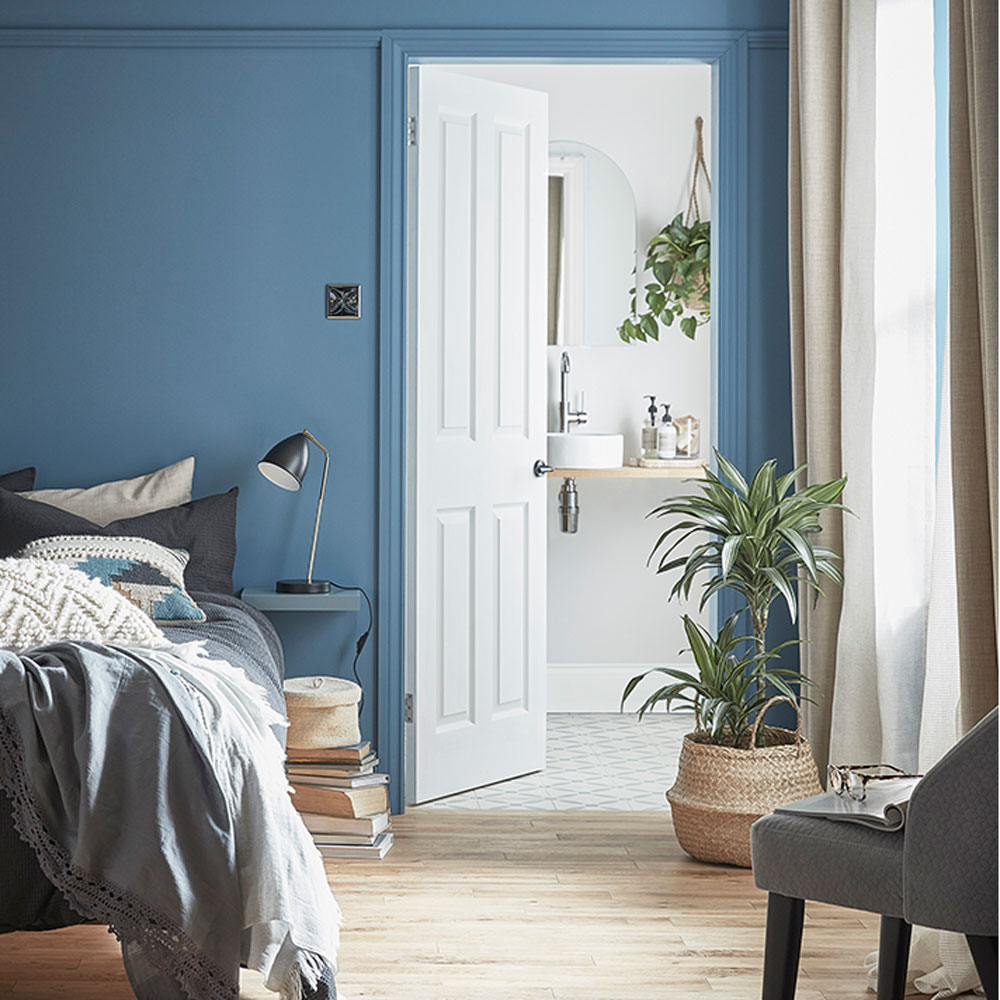
Small spaces like en-suite bathrooms and cloakrooms can be a challenge when choosing a paint colour, as these areas often tend to be windowless and gloomy. Avoid dark, saturated colours which can sap any light there is and instead opt for pale light-reflecting shades.
White with a hint of a tint will feel less stark than pure brilliant whites. Choose a shade that complements the adjoining bedroom, so that the colours don’t clash when the door is open. Create contrast with a darker colour on bedroom walls, or opt for the same shade throughout to give the whole area a sense of flow and spaciousness.
8. Reflect light to make a small bathroom feel bigger
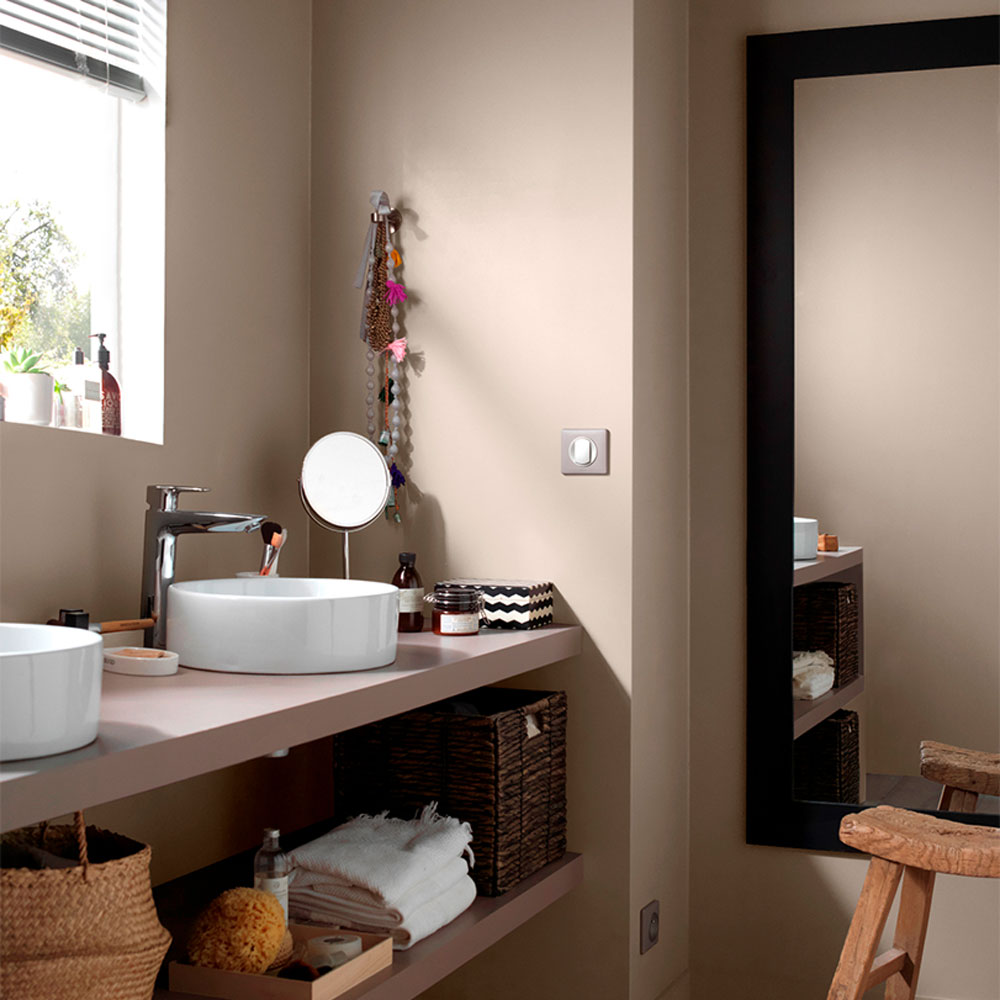
Create a feeling of spaciousness in a small bathroom by using the same mid-toned paint colour throughout on walls, woodwork and ceiling. With no harsh line breaks to interrupt the sightline, walls will appear to recede and the whole bathroom will feel much bigger.
Try another trick that designers often use in small bathrooms. A large mirror can help to reflect light around the room and make the space feel more light and airy. Try to position it where it will catch incoming light from a window.
9. Perk up a white bathroom with blocks of colour
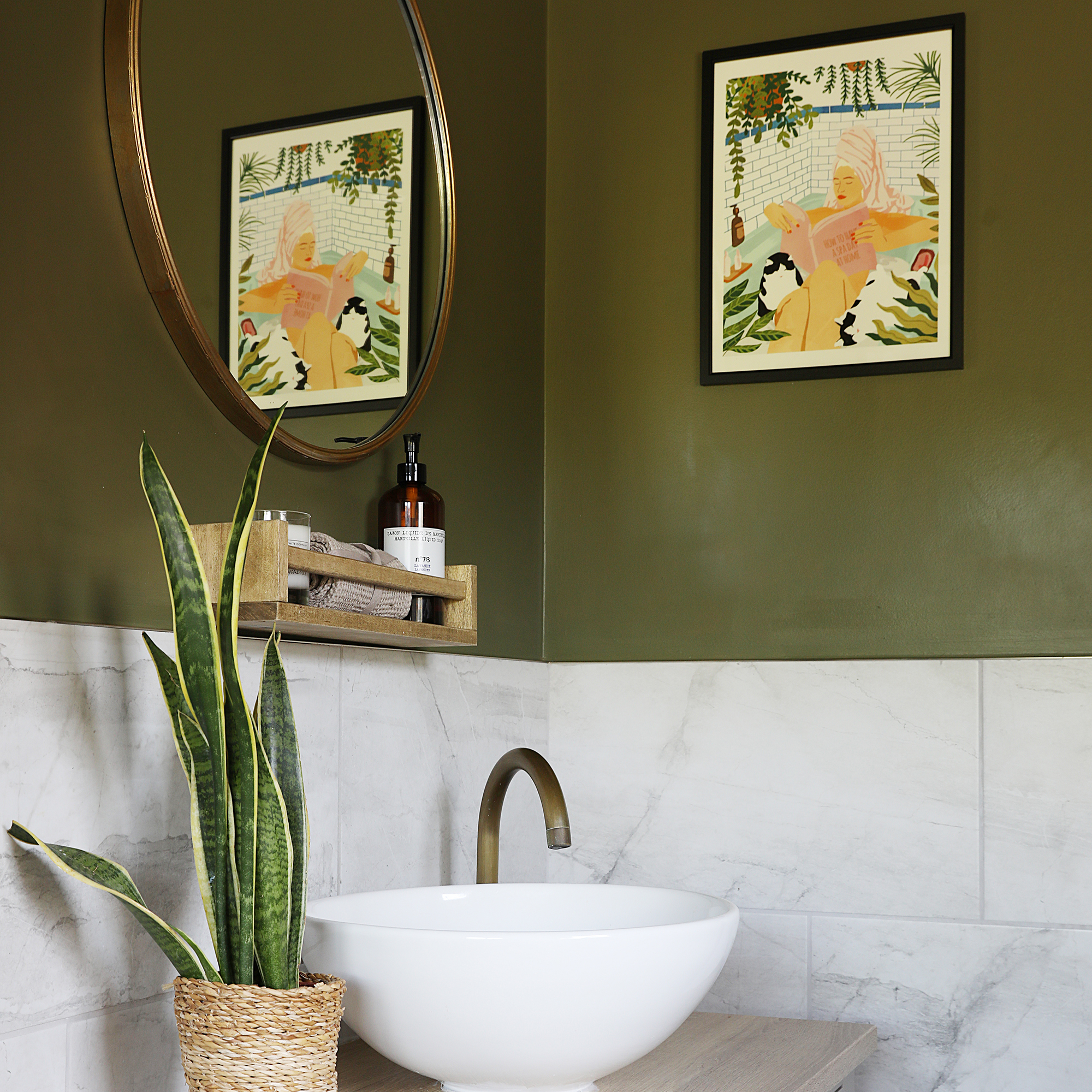
Don’t shy away from using bright colours in a bathroom. If all-over colour is a step too far, consider adding blocks of colour in strategic places to add punch to a classic white bathroom idea.
Painting just one wall in a small bathroom is a great way of giving a small space a colourful focal point that won’t be too dominating. Or add a block of colour on a window recess or on a wall behind the basin or loo. Small bathrooms often have awkward alcoves and niches - painting an alcove a perky shade is a fab way of drawing attention to it.
10. Paint panelling in wipe-clean finish
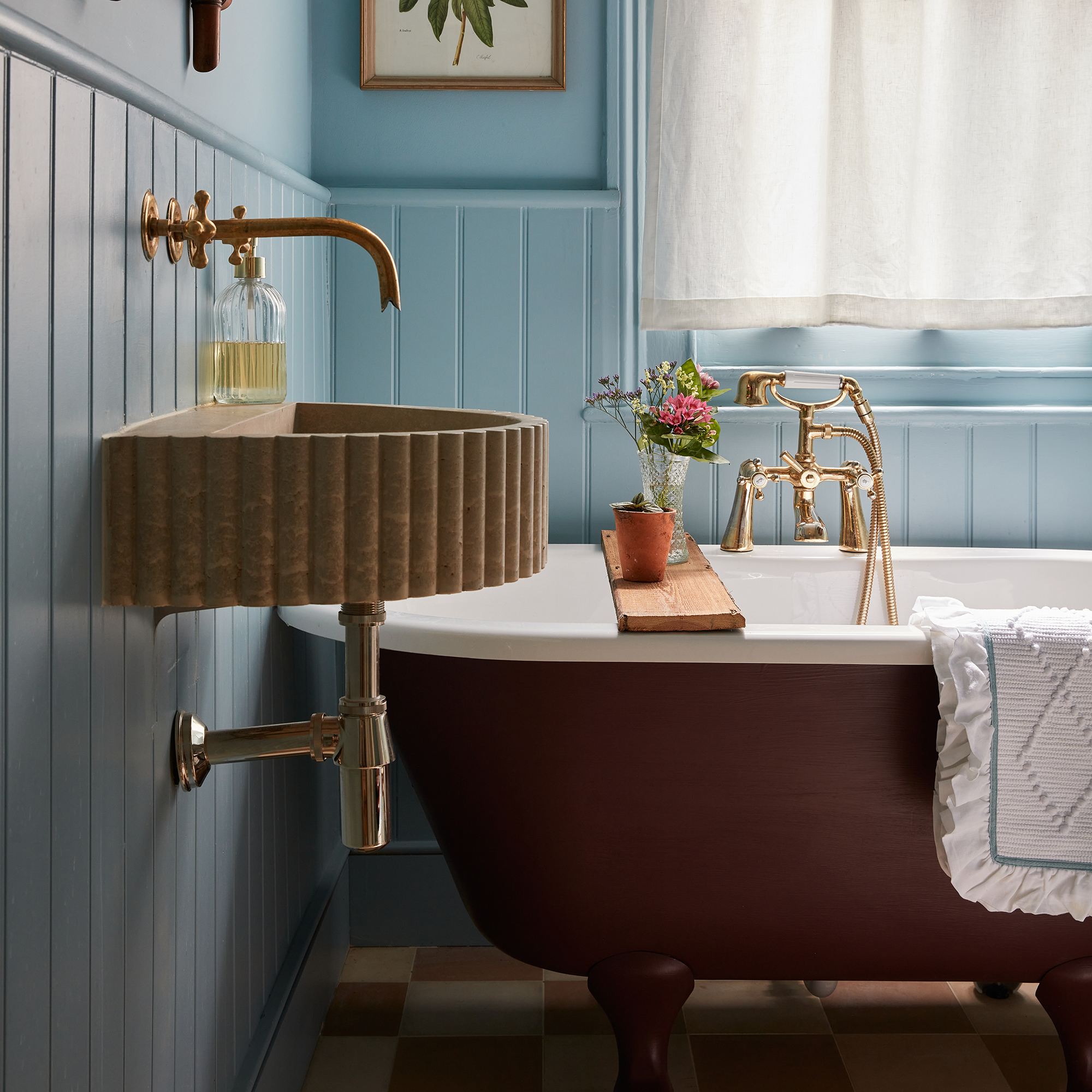
Protect bathroom walls from splashes by cladding the area around the bath with timber panelling. Opt for country-style tongue-and-groove panelling in a cheery shade or try a more traditional style with classic wainscot panels painted in a heritage colour.
Position wall panelling at mid-height around the bathroom and paint with a semi-gloss or eggshell finish paint to give a practical wipe-clean surface that won’t be affected by the odd water splash here and there. Give panelling a decorative edge by topping it with a shelf trim which will give a handy ledge for displaying pictures and favourite keepsakes.
11. Take a dark colour wall to wall
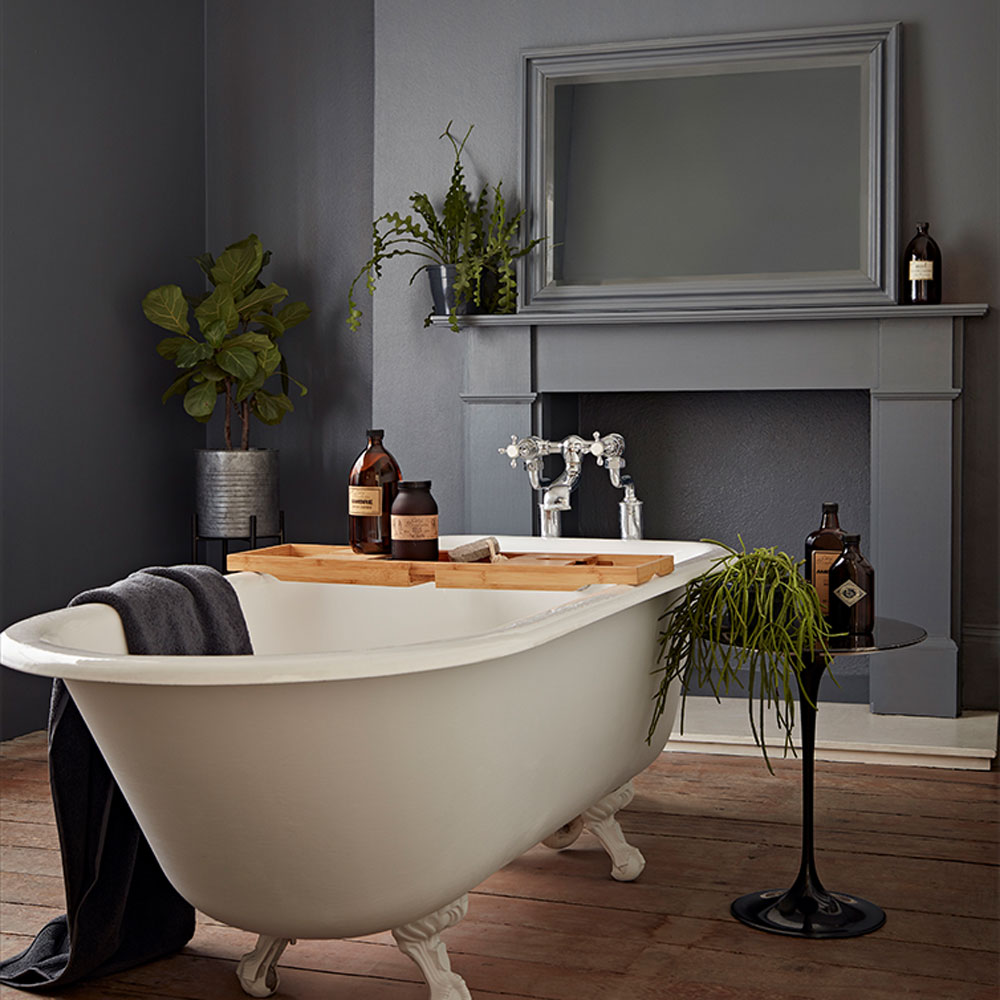
‘People are often reserved about using dark colours in their homes but they really shouldn’t be,’ says Justyna Korczynska, Colour Consultant at Crown. ‘Bold, dark shades have an incredible power and are able to transform any room injecting character into it.’
‘A good way to start introducing a darker shade into your home is to decorate one of the smaller rooms, that are used for shorter periods of time, like a bathroom or hallway. Dark colours work surprisingly well in small spaces, even where there is no natural light available there.’
‘If you’re feeling confident, try to envelop the whole room in this shade, together with doors or any other woodwork. This works especially well for period properties. A bold shade can introduce a style into a room and can help create a space you’ll truly love.’
12. Zone a space with paint
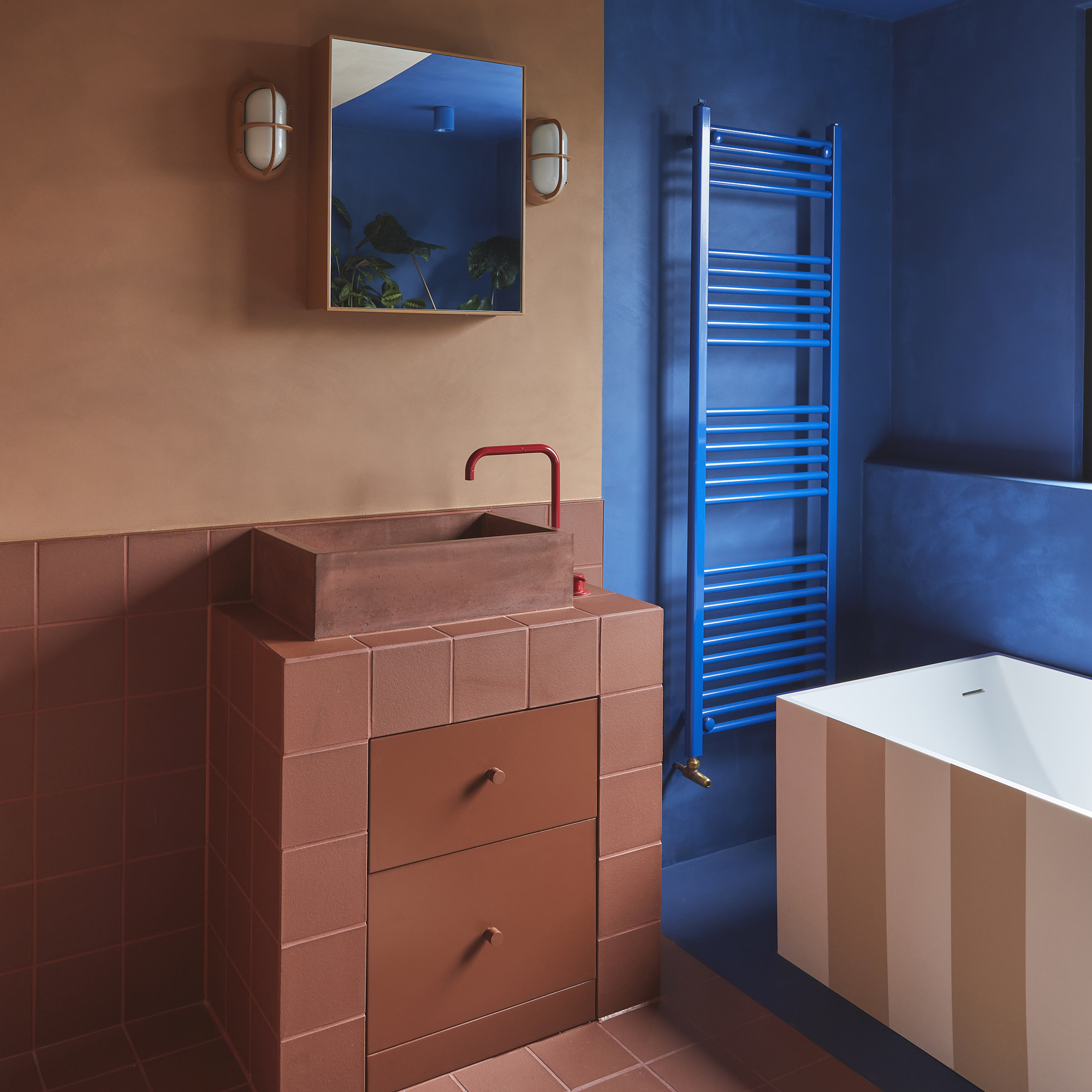
A bathroom is a primary functional space and squeezing in everything you need for daily life can be tricky in a relatively small room. To make separation between wash spaces clearer, try using paint to visually differentiate the different zones.
Colour zoning will make for a more aesthetically pleasing space and can even make a bathroom look larger - perfect if your family bathroom feels cluttered and drab.
FAQs
What paint finish should I use in a bathroom?
Choosing the right paint finish for a bathroom can be confusing. Bathrooms tend to be damp and steamy, so need a paint that can hold up well in humid conditions.
As a general rule, the glossier the paint, the more durable, washable and water-resistant it is. When it comes to walls, flat, matt-finish paints are best avoided as they are least resistant to moisture and aren’t washable. Satin and semi-gloss finishes are a better option as they are durable, moisture-resistant and easy-clean.
Or consider specially formulated ‘Bathroom’ paints which have all these properties and are often mould-resistant too, which can be a problem in damp bathrooms.
For woodwork and trims, that are prone to scratches and scuffs, opt for semi-gloss and gloss or eggshell if you prefer a softer low-shine finish. These are all harder-wearing and have a washable, wipeable finish that is perfect for bathrooms.
What is the best colour paint for a bathroom?
‘White tends to be the main go-to colour for the bathroom. Some think that all-white can be too clinical but having a lighter tone will open up the space and make it feel brighter,' says Crown's Justyna Korczynska of the best colour to paint a bathroom.
‘Bathrooms are often the smallest room in the house and a dark colour can make it feel too closed. Unless you are lucky enough to have a large space with lots of natural light. Crown’s Milk White is a perfect colour for your wet room, it has a creamy quality to it which will create soothing tones and avoid looking too harsh.’
‘White also works well with brass accessories as it will allow them to stand out against the background. This is also true for coloured bathroom ceramics or accessories, painting the wall a light colour will help them stand-out and be the focal point of the room.’
‘However, if white feels too sterile, greys are extremely versatile and will work perfectly in a bathroom. Crown’s Soft Steel is a light grey hue and will give the room more texture than a white. Our Bathroom paints are specially formulated with built-in anti-mould technology to keep bathroom walls looking fresh and cleaner for longer.’
Which paint idea are you going to give a try?

Lisa is a freelance journalist who has written about interiors for more than 25 years. Previously editor of Style at Home magazine, she has worked on all the major homes titles, including Ideal Home, Country Homes & Interiors, 25 Beautiful Homes and Homes & Gardens. She has covered pretty much every area of the home, from shopping and decorating, crafts and DIY to real homes and makeovers and now regularly writes gardening stories for Ideal Home.
- Holly CockburnContent Editor